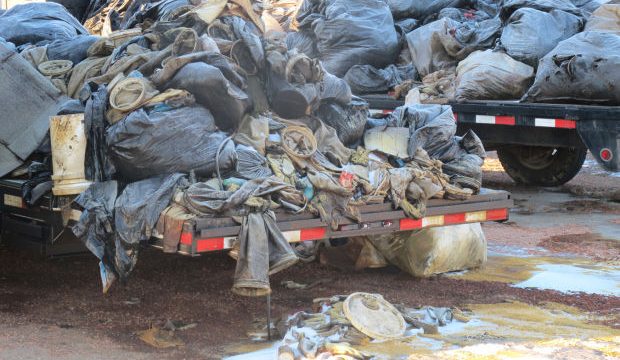Jay Almlie: Put Science Before Emotion On North Dakota's Radioactive Waste

Radioactive waste . . . NORM waste . . . “hot” filter socks . . . illegal dumping . . .
Many attention-grabbing headlines have been written in the past year. What’s it all about? What do these headlines really mean to the public and the North Dakota landscape in which we take such pride?
These are reasonable questions that demand solid answers. Unfortunately, the science behind the issues does not translate easily into a quick news story. It is time to put science before emotion to counter some of the misconceptions and even exaggerations about what NORM is, how it is disposed of, and why industry and state regulators are working together to ensure the safe and responsible disposal of these materials.
NORM stands for naturally occurring radioactive material with radioactivity in excess of 5 picoCuries per gram of bulk material (a measurement of radioactivity per unit weight of material). Radioactivity exists in all natural materials, including soils, rocks, water, and even air. It is present in food, building materials, electronics, and even that wristwatch you’ve been wearing for years. And yes, NORM is present in Bakken shale. It is brought to the surface via drill cuttings and water that naturally exists in some geologic formations.
Although a small number of irresponsible business owners have put this issue in the public spotlight, the vast majority of industry has been handling NORM properly since the early 1980s when the issue first arose in oil and gas exploration. Oil producers in the Bakken currently spend large sums of money to transport materials that may or may not contain NORM to licensed special waste landfills in Colorado, Texas, Idaho, and other states. These materials must be hauled long distances because North Dakota does not currently have NORM-specific regulations permitting in-state disposal. It is for this very reason that industry is working with state regulators to put the proper regulations, infrastructure, and facilities in place to safely and responsibly dispose of any NORM specifically associated with the oil and gas industry.

Under current North Dakota regulations, material or equipment in which less than 5 picoCuries per gram is measured may be disposed of without restriction. The regulated radioactivity threshold is specific to two isotopes, or radioactive particles, of radium. Putting this in perspective, the granite countertop in your home can likely not be disposed of in a North Dakota landfill under current rules. The countertop has a low level of radioactivity, as does common cat litter. Bananas, coffee grounds, Brazil nuts, and other foods contain similar levels of radioactivity, though not necessarily associated with the radium isotopes. Some phosphate-containing fertilizers, a staple of North Dakota’s agricultural industry, contain NORM activity 5–30 times higher than current North Dakota oilfield waste disposal regulations would allow.
North Dakota needs rules that enable responsible disposal procedures that ensure public health, but we need to keep this in proper perspective. NORM is NOT nuclear waste. It is NOT the highly dangerous material reported in exaggerated headlines and other public statements. NORM is present all around us in our everyday lives. NORM is typically several orders of magnitude (thousands of times) less radioactive than nuclear waste. Words such as “radiation” and “NORM” should not evoke the emotional reaction currently sought by some. Instead, we must understand the science to understand the potential impacts.
The improper handling and potential illegal dumping of NORM is strongly condemned by responsible industry and by state regulators, and it underscores the need for licensed disposal sites within our state. Responsible parties agree that having in-state sites to handle the waste generated in the state will discourage improper handling and illegal dumping that now occasionally occur. Making sure that we have those sites available will take thorough research to ensure we have the proper regulations, permitting, and protocols in place, with special consideration given to North Dakota’s unique geology, landscape, and hydrology. The North Dakota Petroleum Council, the North Dakota Department of Health, the North Dakota Industrial Commission’s Oil and Gas Research Council, and the University of North Dakota’s Energy & Environmental Research Center are collectively working toward this end. In working together, we can ensure that we continue to develop our energy resources safely and responsibly.




